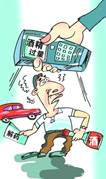题目内容
The door remained ____. I didn’t know where he had gone to .
A. closed B. closing C. close D. to be closed
A
解析:
remain是系动词,它后面要跟形容作表语,这里的closed是形容词.


Virginia is set to begin enforcing the toughest drunken-driving punishment, one that will require thousands of first-time offenders—whether they were highly drunk or slightly over the limit—to install in their cars blood- alcohol testing devices that can lock the ignition. The devices work like this—A driver must blow into a blood alcohol device linked to the car’s ignition. If the result is higher than the legal limit, the car will not start. The device also requires random “rolling retests” once the driver is on the road.
Virginia’s current law requires only repeated offenders or those with a blood alcohol level of 0.15 or higher to have an ignition interlock device in their cars.
The new law, which takes effect in July, will roughly increase the number of people required to use ignition interlock devices four times, and offenders will have to pay about $ 480 for a typical six-month installation.
The measure has caused a debate between groups battling drunken driving and those representing offenders. Such groups as Mother Against Drunken Driving and The Washington Regional Alcohol Program say that Virginia’s 274 alcohol-related road deaths and more than 5,500 injuries in 2010 remained unacceptably high despite years of cracking down on drunken driving. Ignition interlock devices, they say, reduce repeat offenses. But some public defenders and lawyers argue that the devices are too severe a punishment for offenders at the legal blood alcohol limit 0.08, and that the court system will be burdened by more cases going to trial and lower-income drivers will be affected by the fees.
Del. Sal R. Iaquinto, who sponsored the bill, had a simple reply for concerns about the costs of the interlock devises: “How much does a life cost?” “Blowing into a tube for six months, you will remember that,” Iaquinto said, “And you’re not likely to offend again.”
【小题1】The underlined word “ignition” in Paragraph 1probably refers to the part in a car where ___________.
| A.the alarm goes off | B.the engine starts | C.the door opens | D.the car is fueled |
| A.The first time drunken-driving offenders. |
| B.The drivers who are not able to pay offence fees. |
| C.The repeat drunken-driving offenders. |
| D.Drivers whose blood alcohol level is below 0.15. |
| A.fewer cases go to trial |
| B.lower-income drivers will not afford to drink again |
| C.interlock devices increase repeat offenses |
| D.the devices are too severe a punishment for offenders |
| A.prevention is better than cure | B.no law is absolutely perfect |
| C.punishment is the key to all | D.justice has long arms |
| A.Negative. | B.Indifferent. | C.flexible. | D.workable. |